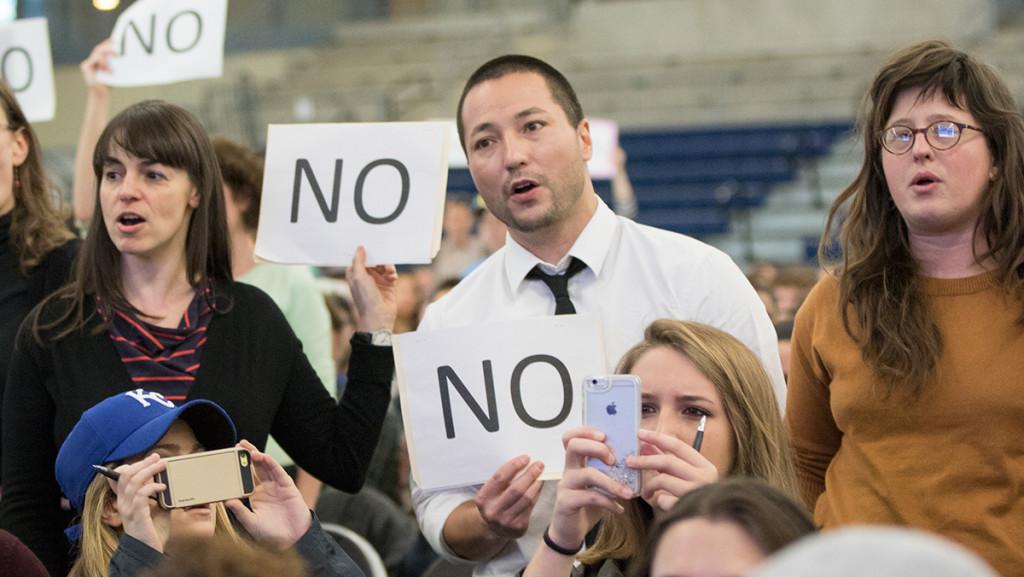Faculty at Ithaca College have expressed mixed reactions to the early retirement of President Tom Rochon. Some believe it was the right call, some feel Rochon should leave the college sooner, while others said Rochon did not deserve the criticism he received.
Rochon announced his early retirement Jan. 14 after a tumultuous fall semester of protests concerning racial incidents that happened on campus. Staff Council, Faculty Council and the Student Government Association also conducted no confidence votes on Rochon.
In the student vote of no confidence, 71.75 percent of student voters expressed no confidence, with 3,756 out of 6,907 who were emailed the poll voting. In the faculty vote, 77.8 percent of those who voted said they had no confidence, with 406 out of 469 faculty at the college who were emailed the poll voting. In the staff vote, 48 percent of voters expressed no confidence, with 407 out of 705 staff members who were emailed the poll voting.
Faculty at IC, a group of independently organized faculty at the college, released a statement saying they were pleased to hear about the news of Rochon’s retirement. According to the release, the group believes the college will continue gaining ground on issues of inclusivity and shared governance on campus, even with Rochon still in office for the next 18 months.
Asma Barlas, professor in the Department of Politics, said she was upset that Rochon would retire in 2017, rather than resigning immediately. She said the Ithaca College Board of Trustees did not make the right decision by allowing him to stay.
“The reason this is significant is because, essentially, he’s refusing to admit that an overwhelming majority of faculty and students who voted last semester rejected his leadership,” she said.
Barlas said she would rather have an interim president because she thinks there will be a struggle between faculty and Rochon during his remaining year in office.
Patricia Rodriguez, associate professor in the Department of Politics, said it is good news that Rochon is retiring and that it would not have happened if it weren’t for the campus community’s speaking out about issues of diversity, governance and feelings of exclusion and discrimination on campus. The bad news, she said, is Rochon will stay for the next 18 months.
Rodriguez said she hopes the rest of Rochon’s tenure does not include hostility toward protesters and those who are expressing their feelings on campus. She also said she hopes the type of dialogue that continues is not just “the same old story” coming from Rochon and the administration.
“It would be very important for him and the administration to listen to the voices and listen to the possibility of different directions and different models,” Rodriguez said.
Warren Schlesinger, associate professor in the Department of Accounting, said he thought Rochon made the right decision by retiring early given the perception that issues of racism and bias were not handled well on campus, in part by the POC at IC protests.
Schlesinger said he feels Rochon is personally committed to making the college a more inclusive and bias-free campus through hiring and promoting more diverse faculty and staff, as well as increasing students of color on campus. However, he said his response to addressing racism on campus, and nationally, was too slow.
“I really believe that he is committed over the next year and a half of his time in office to more significantly address this issue with the cooperation and support from the community,” Schlesinger said.
Tatiana Patrone, associate professor in the Department of Philosophy and Religion, said she thought the retirement and timeline of Rochon’s stay was reasonable given the slow nature of the hiring process.
Patrone also said she did not think Rochon was a weak leader, and she thought he came under fire for many decisions unjustly.
“He was faulted for decisions that — from my point of view — were not described accurately or were not made by him,” Patrone said.
Patrone said she understands why Rochon made the choice he did to retire and that at this point, it was the best choice for the college. She said the next step for the campus should be focusing on healing so the community can move forward on issues of shared governance and diversity.
Deborah Rifkin, associate professor in the music theory, history and composition department, said she thought Rochon made the right call in putting projects and initiatives on hold and shared Patrone’s opinion about focusing on moving forward as a community.
“My biggest hope is that we use the energy and success that we have built on last semester to really figure out what shared governance is and to make this a better institution and a better place for everyone to not only feel safe, but empowered,” Rifkin said.
As for Barlas, she’s still skeptical about how the next 18 months under Rochon will affect the campus.
“Faculty are now being invited for coffee and croissants by some upper-level administrators, but this doesn’t change anything,” Barlas said. “It just puts a friendly face on the authoritarian and corporatist structures at IC.”
Despite Barlas’ mistrust, she said she hopes she will be proven wrong.








